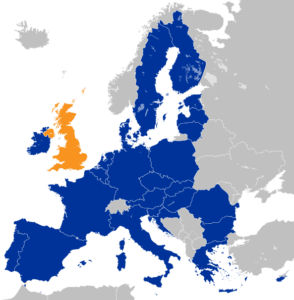By Lucy Caulkett-
A cloud of uncertainty is dampening the UK Economy, The chancellor has told the Treasury committee of MPs.
The poor state of affairs can only be resolved once there is progress in talks with the EU, but this would depend on the EU agreeing to discuss its future relationship with the UK as soon as possible.
As things stand, EU chiefs have insisted they will not begin talks with the UK until Uk pays a divorce bill, and agrees terms in relation to the powers of the European Courts of justice (The ECJ). The European Courts of justice currently have the power to override decisions in the national courts of member state, but Britain want British judges to be totally independent of European judges when Brexit officially begins. The strong economic uncertainty of how Brexit will play out has destabilised the exchange rate, destabilizing the strength of the British currency, and making prices in many Uk markets higher.
If this trend continues, overall affordability of British citizens will plummet to new lows for those whose financial situation remains static amid the sluggish progress of talks between the UK and the EU.
Chancellor Hammond told MPs, he was preparing for all possible outcomes, including “no deal”, and would make money available in a “timely” manner when needed. The chancellor said he wouldn’t take money from other areas, like health or education, now just to “send a message” to the EU. However, in a drammatic contradiction of Hammond’s statements, Theresa May said she would fork out money now to spend in preparation for the possibility of a ‘no deal’ outcome.
Strong warnings have been made that an absence of funds for extra customs staff and infrastructure in November’s Budget would leave the UK “scrambling” to implement new border controls if there was no deal. Hammond said money not set aside would be considered a “a sign of weakness” by EU leaders who would consider the UK not serious about leaving the EU without a deal. Theresa May may have just shown the required strength in her promise to spend money now in preparation for the contigancy of a no deal scenario. The weakening UK economy desperately needs to adjust quickly; reducing the lingering uncertainty around Brexit will go a long way to achieving this.
Theresa May had already revealed this week that the government had contingency plans for a Brexit scenario without a trade deal, though the Chancellor believes a no-deal end to negotiations with the EU would be disastrous for the UK. All the UK economy needs is for businesses and investors to perceive more stability and sense of order and progress in Brexit talks to show good signs for the future. Otherwise several businesses and organisations will begin to relocate like alot have already done in the last year or so.
“I am clear we have to be prepared for a no deal scenario unless and until we have clear evidence that this is not where we will end up.”
He said there would be a “decision point” at which departments would have to decide whether to fund programmes after Brexit in the event of no deal being reached but that moment had not yet been reached.
“What I am not prepared to do is allocate funds to departments in advance of the need to spend,” he added.
“We should look in each area at the last point that spending can begin to ensure we are ready for a day one no deal scenario. That is when we should start spending hard-earned taxpayers money.
“Every pound we spend on contingency planning on a hard customs border is a pound we can’t spend on the NHS, social care or education. I don’t believe we should be in the business of making potentially nugatory expenditure until the very last moment when we need to do so.”
“We will spend the money in a timely fashion to ensure we are ready but we will not spend it earlier than necessary just to make some demonstration point.”




